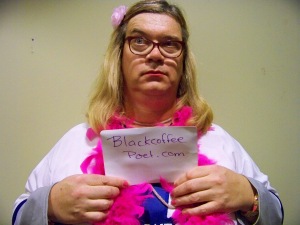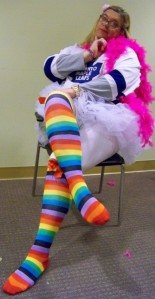Stefonknee Wolscht is a 49 year young Canadian spiritual transwoman; passionate defender of trans rights; resource navigator for marginalized LGBTQ people at Stefonknee.com ; public speaker; activist; dad/mom of 7 wonderful kids; Opa to Jake & Rebecca; sexy and single.
Stefoknee is the main feature of the documentary film Living 2 Live/Dying 1000 Deaths. Read a review of Living 2 Lives/Dying 1000 Deaths, a documentary about Stefoknee’s life.
Black Coffee Poet: Why did you agree to do this film?
SW: This is my story it seems unbelievable, watching it helps me get it out of my head. There is a sense of closure knowing it has been documented, I can let some of it go and try to move on. It takes the pressure off of me, the pressure of having to have to remember all the details while everything spirals out of control.
BCP: What was the process in making the film?
SW: I met Dana at Ryerson when I spoke about oppression at her homeless in society class. Her teachers Pascal Murphy and Sarah Harrison took time to prepare their class for the many issues that I have been forced to confront… the students really got it and really cared. It was Dana that called me and asked if she could do this as her class project, how could I say no? She was validating everything that I had endured and wanted to take away some of the pain. We filmed for five days to make a thirty minute film, we all cried so much during the filming; it was all so new and very raw for me. When it was done she got 110% for her effort, and everyone that watches it, including myself, were moved by the way she could say so much in thirty minutes and still make it seem unrushed and very relaxed. It broke my heart that the story was mine, as if I never heard myself tell it. I knew every part, but distanced myself from the actual events.
BCP: With Trans folk constantly misrepresented by media, how did the film maker earn your trust?
SW: From the very beginning, Dana was extremely emotional and extremely committed to validating what was happening to me. I had to trust her, there was no one else listening!
BCP: What do you want people to take away from the film?
SW: I hope the viewer realizes that this is not a unique experience for trans-persons. This is far too common. I hope they begin to understand that, despite looking different on the outside, we are really all the same on the inside.
BCP: You are very transparent about the difficulties of your current life as a Trans woman in this film. Was the film a form of healing?
SW: Yes extremely healing. As I stated before it has helped me deal with most of the baggage from my separation due to my gender issues. The only thing I can’t seem to deal with is the loss of my children.
BCP: Have any things changed for the positive since the film?
SW: My personal situation hasn’t improved. Systemically, our provincial government has passed Bill 33 (Toby’s Act) and now the various ministries are creating ways to apply our newly achieved human rights. It is a slow process but things are getting better all the time for young trans-persons dealing with all the issues for the first time. I have created a website www.stefonknee.com and it is very clear to me that while I am adding links and resources for the trans community, I see a huge increase in acceptance within society toward youth beginning their transition now, they don’t seem to have to lose everything. For those of us that have suffered so much loss it seems almost impossible to get back to living a normal life.
BCP: What has been the overall response to the film?
SW: Those thirty minutes of words change people’s lives. I can’t explain it. I have given out hundreds of copies and I know the people who’ve taken the time to watch it, they are compelled to contact me and let me know how it has affected them. The rest? I’m not sure, I guess they got too busy to drop it into their DVD Player and take thirty minutes to watch it, or have since lost it or forgotten about it. One day they will find it and when they do they will let me know.
BCP: Has your family seen it?
SW: I don’t think so. A few friends from my old church have copies and they have watched it many times. They don’t know how to express what is real from what they have been told to believe. It’s very hard for a Catholic to accept it despite knowing it’s true. So they don’t show my kids.
BCP: Trans Day of Remembrance is this week. What does TDOR mean to you?
SW: TDOR is a very confusing time for me, I seem to envy the dead, they don’t have to wake up and deal with the same negative attitude day after day. Yet I miss the people that have worked so hard to make this a better world, I seem to think they deserve to see how much is changing because of their activism and hard work. It isn’t fair that they can’t enjoy the fruit of their labour.
BCP: There are a lot of problems around TDOR such as passing Trans men, and white folk, taking over, amongst other things. Can you speak to these problems?
SW: I don’t want to talk about division within our community or for that matter within any minority. We suffer enough, isolation from each other should not be added to the mix. There are various levels of privilege but we are all oppressed, dwelling on slight differences is counterproductive. I believe *CIS gender people with privilege perpetuate the *“passing” index factor as a way to add preconceived stereotypes back into our lives. This is a way for them to divide and conquer, a technique that has always been very effective in keeping marginalized people from joining together to rise above oppression and compete as equals within society and receiving their piece of the pie so to speak.
BCP: When I asked my friend Cindy Bourgeois, a non-passing Trans woman, to collaborate on doing something for TDOR on my website she said, “I’m a white, middle class, trans woman. TDOR isn’t about me; it’s about Trans women of colour who are sex workers.” Cindy feels by stepping away she is being an ally to Trans women who are most affected by violence: Aboriginal women, women of colour, and sex workers. What is your opinion?
SW: I have heard that before, even from my friend Kyle Scanlon who had a job and some privilege, but he took his life on July 3rd, 2012. I am white and I haven’t worked in the sex trade, but that doesn’t mean I have privilege.
Wendy Babcock was white (not transgendered) but she spoke for up for sex trade workers while working hard to become a lawyer, a place of privilege , but she killed herself too. I have lost my children, have been disowned by family, church and friends, been homeless, I’ve lost all I worked forty-six years to achieve, I am unemployed for the first time in my life, I am now a convicted criminal, I suffer from PTSD and am constantly thinking of killing myself… I could go on and on, how much difference should my skin colour and sexual practices make when there is nothing left to live for? Again, I suggest that this is another attempt to divide and conquer.
Could my situation be worse? Of course! There are many people that suffer much worse than Cindy, Kyle and myself throughout the world… but in the end Kyle is still dead. I envy him and Cindy seems to be coping, great but no one would suggest that Cindy and I are not qualified to speak about what it’s like to be transgendered in 2012, and some of the reasons Kyle is dead. Many transgendered people and sex trade workers are killed, and many kill themselves, either way, it is caused by various forms of oppression, discrimination and bullying. Whether you kill me or make me want to kill myself, I still end up dead. The dead can’t speak, so now it is our responsibility to speak for them. It is a far worse sin to remain silent hoping that someone else will speak up… I speak up now and I will keep speaking up until I too am dead too, then someone else will have to speak for me.
BCP: How can non-Trans people be good allies to Trans peoples?
SW: Pathos! (suffer vicariously) empathize, sympathize, comfort. Join our numbers and demand change, help us get out of this rut, create safe spaces, accept us for who we are, comfort us when we are weak or when we mourn, defend us and stand with us when we are being bullied or attacked, give us a reason to live. Don’t remain silent just because you are not transgendered, shine a light into our darkness and give us hope when we feel hopeless. If you have a reason to live, share it, we need a reason to live too!
BCP: Would you like add anything that I have not asked?
SW: I am not angry. I am tired, frustrated and confused. I work really hard to give our community a voice, please watch more documentaries about us and take a moment to visit my website www.stefonknee.com. I did not create it for me, I created it to help others find help and to navigate the scattered resources that I had to search for while isolated and oppressed. Link me to other resources you know of that are trans friendly and link them to me. Talk about music, sports, politics, money and religion with your families and friends, but share the video too, open up the dialogue and educate them about oppression and suffering and help make this a better world. Take them out of their comfort zone and become our voice.
And… if you see my kids hug them and tell them I love them.
(((Hugs))) Stefonknee
*Cisgender (adj.): A cisgender person is someone who identifies as they gender/sex they were assigned at birth. For example, your birth certificate says female, and you identify as a female woman.
The colloquial use of cisgender suggests that it is the opposite of transgender. If you’re not trans*, then you’re cis (abbreviated form of cisgender). This is not entirely true, because there are people who transition (eg. take hormones, identify as a different gender than what they were assigned with at birth, surgeries, etc.) who do not identify as trans* or transgender.
*Pass (verb): In the trans* community, to pass is to be perceived as the gender you identify as. It’s typically, but not always, used in the context of a trans* person discussing their experience in the public world. There’s some debate around the term in that it connotes that one is trying to pass under the radar as someone they aren’t when that isn’t the case.
This was originally posted on the blog Black Coffee Poet, who aslo has a review of the film Living 2 Lives/Dying 1000 Deaths which features Stefoknee.



